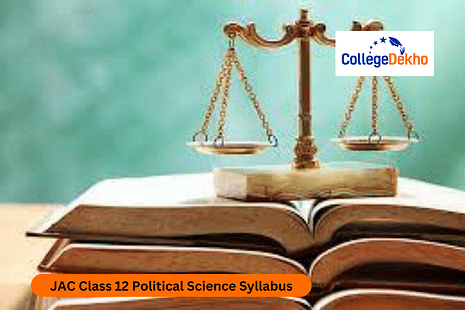

Never Miss an Exam Update
JAC Class 12 Political Science Syllabus 2025-26 consists of a total of 15 chapters. The syllabus is divided into two sections, with 7 chapters in the very first section and 8 chapters in the second section. You will find the following chapters included in the curriculum according to the latest curriculum PDF: The End of Bipolarity, Contemporary Centres of Power, Contemporary South Asia, International Organisations, Security in the Contemporary World, Environment and Natural Resources, Globalisation, Challenges of nation building, Era of one-party dominance, Politics of planned development, India’s external relations, Challenges to and restoration of the Congress system, The crisis of democratic order, Regional aspirations, and Recent developments in indian politics.
You can check out the marks allotted for each chapter through the JAC Class 12 Exam Pattern 2026 . The theory paper in Political Science will be conducted for 80 marks, while 20 marks are allotted for project work. If you want to download the latest PDF of the JAC Class 12 Political Science Syllabus 2025-26, scroll down below:
JAC Class 12 Political Science Syllabus 2025-26
With over 15 chapters included in the curriculum, you need to study each chapter in detail. It is wise to start studying for the exam from the beginning of the academic year to complete the syllabus on time. Check out the detailed syllabus from the table given below:
| Unit | Chapter/Topics |
|---|---|
| PART A-CONTEMPORARY WORLD POLITICS | |
| Ch 1: The End of Bipolarity |
a) The Soviet System
b) Gorbachev and the collapse c) Reasons behind and effects of the Soviet Union's dissolution d) Shock Therapy and its Consequences e) New entities in world politics
|
| Ch 2: Contemporary Centres of Power |
a) European Union
b) Association of Southeast Asian Nations c) Rise of China as an economic power d) Japan and Sout |
| Ch 3: Contemporary South Asia |
a) Military and Democracy in Pakistan and Bangladesh
|
| Ch 4: International Organizations |
a). The significance and intent of international organizations.
h) Key Agencies: IMF, World Bank, WTO, ILO, IAEA.
|
| Ch 5: Security in the Contemporary World |
a) Security Type and Meaning.
b) The conventional view of security. c) Unconventional ideas about security. d) Novel Threat Sources. f) Security Cooperation. f) The security policy of India. |
| Ch 6: Environment and Natural Resources | a) Environmental Concerns
b) Global Commons
f) Resource Geopolitics
|
| Ch 7: Globalisation |
a) Concept of globalization
b) Causes and Consequences of globalization c) India and globalization d) Resistance to globalization e) India and resistance to globalization |
| PART B-POLITICS IN INDIA SINCE INDEPENDENCE | |
| Ch 1: Challenges of Nation-Building |
a) Challenges for the new Nation.
|
| Ch 2: Era of One-Party Dominance | a) The difficulty of establishing democracy. b) Congress dominance in the first three general elect ions.
|
| Ch 3: Politics of Planned Development |
a) Political contestation.
|
| Ch 4: India’s External Relations |
a) International Context
b) The Policy of NonAlignment.
|
| Ch 5: Challenges to and Restoration of the Congress System | a) Challenge of Political Succession
b) Fourth General Election
c) Split in the Congress
d) The 1971 Election and Restoration of Congress
|
| Ch 6: The Crisis of Democratic Order |
a) The emergency's historical context.
|
| Ch 7: Regional Aspirations | a) Region and the Nation
b) Punjab
c) The Northeast
|
| Ch 8: Recent Developments in Indian Politics | a) Context of 1990s b) Era of Coalition
c) Political rise of the Backward Classes
d) Communalism, Secularism and Democracy.
e) Emergence of New Consensus
|
JAC Class 12 Political Science Syllabus 2025-26 PDF
The PDF of the syllabus is available online. You can click on the direct link given below to download the JAC Class 12 Political Science Syllabus 2025-26 and start studying for the papers:
Make sure to download the correct syllabus PDF as uploaded here to understand the curriculum easily and complete it as soon as possible so that you can move on to the model test papers for revision.
Are you feeling lost and unsure about what career path to take after completing 12th standard?
Say goodbye to confusion and hello to a bright future!

FAQs
You need at least 4 to 5 months to complete the JAC Class 12 Political Science Syllabus 2025-26. After completing the syllabus, you can use model test papers to revise for the exam. Make sure to revise in the last one month only. You can also use the previous year's question papers for revision.
Yes, you can use NCERT to study the JAC Class 12 Political Science Syllabus 2025-26 in detail. Make sure to buy the latest NCERTs as published by CBSE if you want to prepare for the exam. There are some changes made to the NCERT syllabus to make sure to buy the latest edition in accordance with the academic year.
If you want to revise the JAC Class 12 Political Science Syllabus 2025-26, you need to download the model test papers available on the official website of the Jharkhand Academic Council, or you can also download the previous years' question banks and papers for increased practice.
The Jharkhand Academic Council has released the official PDF of the JAC Class 12 Political Science Syllabus 2025-26 on the website, which you can download. There are little to no changes made to the curriculum, so you can continue using old books for preparation.
According to the JAC Class 12 Political Science Syllabus 2025-26, the following chapters are included in the curriculum: The End of Bipolarity, Contemporary Centres of Power, Contemporary South Asia, International Organisations, Security in the Contemporary World, Environment and Natural Resources, Globalisation, Challenges of nation building, Era of one-party dominance, Politics of planned development, India’s external relations, Challenges to and restoration of the Congress system, The crisis of democratic order, Regional aspirations, and Recent developments in indian politics.
Was this article helpful?

















